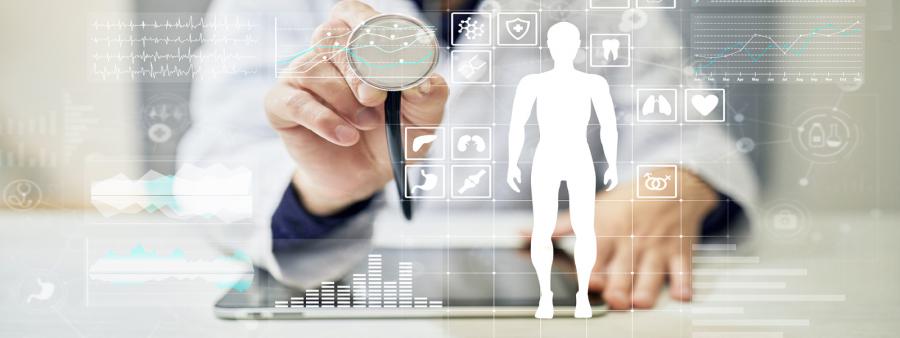Speaking with Maite Garolera: Former student of the Master in eHealth at La Salle-URL

Have you ever wondered how technology can improve people's health? What are the benefits of using current digital tools in the healthcare sector?
The opportunities obtained by the eHealth sector in the face of new technological challenges are some of the questions addressed in the interview with Maite Garolera, former student of the Master in eHealth of La Salle-URL and professional with experience in the field of neuropsychology and cognitive rehabilitation.
Maite, discusses her internships in the sector, and explains how the Master in eHealth has helped her to extend her digital knowledge applied to the health care sector.
Technology is integrated into healthcare to improve patient experience
The eHealth sector is the area that applies information and communication technologies (ICT) in healthcare, with the aim of improving the quality, efficiency and accessibility of current healthcare services. This area includes telemedicine, mobile applications, big data and artificial intelligence systems, among others.
All these tools offer solutions to the 3Ps: personalization, prevention and patient participation, optimizing the processes and resources of healthcare professionals.
Expected investments in AI over the next three years show a higher growth in critical decision support (39% in 2023, compared to 24% in 2021)"
- Future Health Index 2023: Taking healthcare everywhere
The eHealth sector also stands out for its potential growth and development not only nationally, but also internationally. As Future Health Index 2023: taking healthcare everywhere mentions, investment in AI has increased by 15% in the last two years. The eHealth sector not only contributes to the improvement of public health indicators, but also reduces inequalities and helps to generate new employment and business opportunities.
Innovation in eHealth: Maite Garolera's tips for driving change and continuous improvement
As an expert professional in the healthcare sector, Maite Garolera is currently working in the field of eHealth. PhD in psychology, head of the Neuropsychology Unit and director of the Clinical Research Group Brain, Cognition and Behavior of Terrassa. During her years of experience working in the sector, she has been able to learn from emerging technologies, achieving extraordinary results in today's health services.
At La Salle-URL, we had the opportunity to hold a short interview aimed at deepening the current situation of a sector in constant evolution.
You studied psychology, but when did your interest in new technologies begin?
I think that the interest comes from a long time ago, that is, as a clinical psychologist and, in my case, as a professional of clinical psychology who is a specialist in neuropsychology.
From a certain moment I start to realize that there is a whole technological revolt and that all this can be useful to be able to apply it to my patients. So I start to contact people from different fields, some of them from the engineering field, who are working with different technologies and we start to see together what we can do. One of the first people I contacted was working with computer vision, and that's when we started to think together about possible technological solutions to apply to patients.
Since you began to explore technology linked to the field of health, what projects have you been able to develop?
One of the first designs was for patients with obesity. With the help of computer vision we helped them to select meals and modify their decision making. In another area, that of people suffering from mild cognitive impairment, at risk of dementia, we used their personal memories to stimulate them cognitively, also with the support of a camera that recorded all their actions. These images were then analyzed with computer vision.
From this point on, a wide range of possibilities opened up, with the incorporation of other technologies. I was not only interested in computer vision, but I became interested in the Internet for things (IoT), with which we obtained a European grant for the city of Terrassa to offer healthy messages to people with cognitive impairment, mild cognitive impairment and the elderly.
Artificial intelligence was a real breakthrough. It could help us to make predictions in risk behaviors, specifically with suicidal risk behaviors in the subway. I am currently very interested in immersive virtual reality and its applications as a tool for improving cognition and emotional well-being. I have been moving from one technology to another, as they are tools that help us do things that would otherwise be impossible.
My goal is to identify people's cognitive or behavioral problems in order to offer solutions that make noticeable changes. The ultimate goal is to get scientific evidence to reach the service portfolios and, thus, the people who can benefit. This is how a clinical psychologist with expertise in neuropsychology, which is my case, comes into contact with technology.
Let's talk about the Nautilus project in 2020, what was your use of technology in the project and what were its first results?
The Nautilus project focuses on understanding the effects of persistent COVID on the brain, and collects cognitive, behavioral and functional data for analysis.It uses brain neuroimaging, microbiota samples, inflammation markers and genetic markers.
The project is coordinated by the Terrassa Health Consortium, with the participation of the University of Barcelona and the Polytechnic of Catalonia. The project involves 25 hospitals and collects data from approximately 600 people. The UPC analyzes this data using artificial intelligence with which we obtain clusters and predictive models that allow us to give an optimal answer to the questions we ask ourselves.
At this point we are asking for another project, RehabCOVID, which consists of cognitive training through a multimodal program for people with persistent COVID; it includes mindfulness, cognitive training and physical activity. We will compare the group intervention with immersive virtual reality with the home intervention applied with a computer.
Thanks to artificial intelligence we aim to identify determinants of response to the intervention (good and bad responders) and will use cognition, neuroimaging, eye tracking and blood biomarkers related to brain plasticity as outcome measures.
In addition to these projects, we are currently using immersive virtual reality to improve cognition in different groups. ONCOBRAIN is a project in which we apply VR to people with cancer and cognitive problems associated with chemotherapy. REVIVE is a project in which we have designed a VR program for elderly people with age-related cognitive changes.
Have you developed your professional experience in multidisciplinary work teams?
Indeed, at a time when technology is combining and impacting many sectors, multidisciplinary teams are indispensable.
It is clear that clinical professionals cannot develop useful technological solutions without the collaboration of technologists, and vice versa.
Social, business and design professionals are now also involved to ensure the sustainability and viability of solutions. It is necessary to work in multidisciplinary teams to find effective and efficient solutions. In my experience as a clinical psychologist, I have always worked in multidisciplinary teams with other health professionals, such as physicians. Multidisciplinarity is fundamental, as I learned during my stay as a postdoc in the United States, where we would bring together experts from different fields to solve a problem or test a scientific hypothesis.
How can the use of technology help us maintain a healthy lifestyle or prevent brain diseases?
Currently, technology offers us infinite possibilities and is constantly growing. Its incorporation into the healthcare system is imminent, and we must include it and exploit it to improve people's health once its efficacy and efficiency is demonstrated.
There is technological equipment integrated in hospitals, and I believe that in the future it will also be in other healthcare and social areas. Technology does not necessarily have a specific physical location: we must be hybrids and be connected to the technological field. The world of tomorrow will not be segmented, as we are currently experiencing.
Among others, you completed the Master in eHealth at La Salle-URL, what did this training contribute to your professional career?
I think it was a turning point for me and my professional career. I had come from working with technologists on a project related to cameras and computer vision to develop an intervention program to improve the memory of people at risk of dementia, but I had never created a common learning fusion.
Moreover, the master's allowed me to do a combined training with people from different backgrounds, in this case people from the technology sector, making a real immersion in the range of possibilities that were open to us.
The program was a turning point for me, since I knew that part of my research would be developing and validating technologies to apply them to improve cognition, behavior and quality of life of people.

MASTER IN EHEALTH